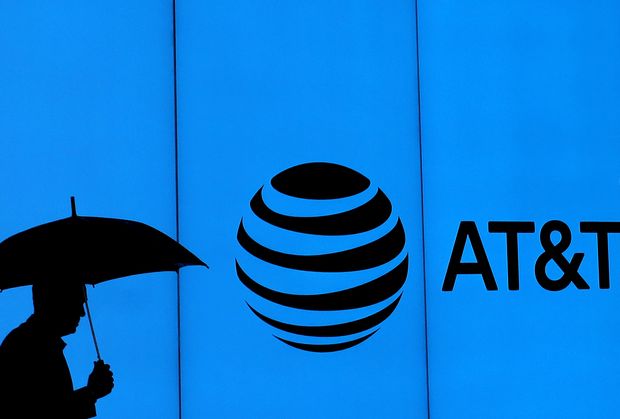
AT&T Inc. is scheduled to post earnings Thursday morning.
Getty Images
Shares of AT&T Inc. extended a slide Tuesday that marked their longest losing streak in more than a decade.
AT&T’s stock T, -0.44% fell 0.5% in Tuesday trading, making for the ninth straight session of declines for AT&T’s stock, and the company’s longest losing streak since the period ended Jan. 15, 2010.
Fellow telecommunications company Verizon Communications Inc.’s stock VZ, -0.08% fell 0.1% in the session. It posted its sixth straight day of losses, and is in its longest losing streak since the stretch that ended July 23, 2019.
The declines for AT&T and Verizon come in the wake of Apple Inc.’s AAPL, +1.31% iPhone 12 launch, which led both wireless companies to take heavily promotional approaches that have become atypical in the past five years. Verizon and AT&T are also set for back-to-back earnings reports, with Verizon on deck Wednesday morning and AT&T due Thursday morning.
AT&T’s earnings call could shed more light on the company’s iPhone strategy, which suggests that the company is looking to defend its wireless segment during a crucial time for its broader business.
As the COVID-19 crisis pressures AT&T’s WarnerMedia film and advertising businesses, and DirecTV continues to shed subscribers, AT&T is increasingly banking on its wireless operations to provide a financial cushion. The company has been the most aggressive with its iPhone 12 promotions when compared with Verizon and T-Mobile US Inc. TMUS, +0.28%, both of which have simpler stories right now.
AT&T is offering generous iPhone 12 subsidies to both new and existing customers, suggesting a big focus on retaining wireless subscribers, especially as T-Mobile bolsters its own 5G network with spectrum it gained through its acquisition of Sprint. But big wireless promotions bring financial trade-offs, and investors may learn more about the company’s strategic vision for this part of the business when AT&T reports financial results Thursday morning.
“While AT&T’s offer is considered the most aggressive and Verizon’s offer the least aggressive, AT&T is actually playing defense while Verizon is playing offense,” Barclays analyst Kannan Venkateshwar wrote in a note to clients. “While AT&T could benefit from churn reduction, this process is likely to be expensive and is reminiscent in some ways of the aggressive DirecTV promotions ~3-4 years ago which resulted in significant churn at DirecTV last year when the promotions rolled off.”
Venkateshwar rates the stock at equal weight with a $31 price target.
Another focus of AT&T’s earnings results and conference call will be efforts to improve operational performance more broadly across the business. AT&T is reportedly considering selling some portion of its DirecTV unit and Morgan Stanley analyst Simon Flannery wrote that the company is pulling back on marketing for its low-speed DSL service, which makes up just a sliver of the company’s broadband base.
A divestiture of DirecTV “would likely generate a significant loss,” Flannery wrote, though “the transfer of debt should limit any impact to leverage” Further, “deconsolidating a business with double digit revenue declines could allow investors to focus more on the potential of the other parts of the business,” he wrote, while maintaining an overweight rating and $36 price target on the stock in a note titled “Business Transformation Moving Forward on Multiple Fronts.”
Earnings Outlook: Intel earnings may be overshadowed by memory dump
MoffettNathanson analyst Craig Moffett argued that for AT&T’s media-related businesses, only HBO and the digital HBO Max service seem “safe.” He ran through a laundry list of other assets that have recently been reported or confirmed to be up for sale, including the Warner Bros. Interactive video game business, the company’s advertising unit that was once called Xander, and Vrio, AT&T’s Latin American satellite-TV business.
“It is unclear whether this is merely the outcome of a portfolio review that found all of these businesses to be strategically superfluous, or whether there is something more urgent afoot,” he wrote, suggesting that the company could perhaps be trying to bolster its cash position ahead of a crucial wireless auction in December or else that AT&T may be under pressure from ratings agencies to reduce debt more quickly.
“[T]he pattern is clear: 1) AT&T is trying to sell almost anything that isn’t nailed down; 2) they are, by and large, getting a disappointing response to the assets being offered for sale; and 3) they are therefore left to dramatically cut costs, even in businesses that are “core” to this latest vision of AT&T,” Moffett wrote, while maintaining a sell rating and $24 target price.
Despite many long-term questions hanging over AT&T, Thursday’s report and call will also focus on the company’s ability to withstand the COVID-19 crisis more recently. Analysts surveyed by FactSet expect that the company generated $41.6 billion in revenue for the September quarter, down from $44.6 billion in the prior period. The FactSet consensus also calls for 76 cents in adjusted earnings per share, down from 94 cents.
AT&T shares have lost 10% over the past three months as the S&P 500 SPX, +0.47% has risen 6%.





